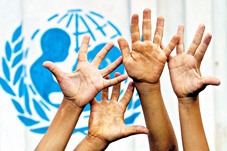
UNICEF Praises Georgian Gov’t For “Bold Step” on Children Allowances
By Gvantsa Gabekhadze
Wednesday, November 7
UNICEF Deputy Executive Director Shanelle Hall has praised the decision of the Georgian Dream government to increase financial social support for more than 140,000 children five times from January 1, 2019.
“We respect the Georgian Government's decision, and we are excited about it because there was a study done on the children that are most vulnerable.
“There is evidence that really established the importance of changing the policy, and the government was bold enough to change the policy. We are really looking forward to seeing the positive impact this will have on the most vulnerable children in Georgia,” UNICEF Deputy Executive Director Shanelle Hall told the Georgian PM on Monday.
She stated that “We appreciate that we are able to do our work on advocating for children and getting evidence” what is needed for them.
The Georgian Dream government announced about the increase of monthly 10 GEL to 50 GEL for the socially vulnerable children under 16 shortly after the first round of elections, in which the ruling party supported candidate failed to accumulate mandatory, more than 51 percent of votes to gain victory.
The runoff is still ahead between the Georgian Dream supported candidate Salome Zurabishvili and the United National Movement candidate Grigol Vashadze.
The opposition claims that the government is taking populist steps ahead of the second round.
The government says that the increase has been discussed since the release of the UNICEF survey in the summer.
Major points of the UNICEF Welfare Monitoring Study released in June were as follows:
General poverty rates in the country increased and a lack of strong and inclusive economic growth, unemployment and increased consumer prices are likely reasons for increased poverty rates.
People’s perception of being in poverty have improved most likely due to the real increase in incomes.
The average out of pocket expenditure on health increased and purchase of medicines remains the main component of healthcare spending.
To cope with economic hardships more families resort to borrowing. Use of financial instruments (banks and pawn shops) considerably increased in poor families.
The gap for the preschool attendance decreased for both urban/rural areas as well as for rich and poor.
6 out of 10 children aged 3-5 from poor families have no or insufficient access to children’s books.
Every fifth child aged 15-18 from the poorest groups is no longer involved in the education.


